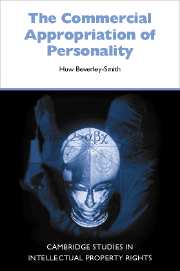Book contents
- Frontmatter
- Contents
- Preface
- Table of cases
- Table of statutes
- Part I A framework
- Part II Economic interests and the law of unfair competition
- Part III Dignitary interests
- Part IV Pervasive problems
- Part V Conclusions
- 12 The autonomy of appropriation of personality
- Bibliography
- Index
- Cambridge Studies in Intellectual Property
12 - The autonomy of appropriation of personality
Published online by Cambridge University Press: 07 July 2009
- Frontmatter
- Contents
- Preface
- Table of cases
- Table of statutes
- Part I A framework
- Part II Economic interests and the law of unfair competition
- Part III Dignitary interests
- Part IV Pervasive problems
- Part V Conclusions
- 12 The autonomy of appropriation of personality
- Bibliography
- Index
- Cambridge Studies in Intellectual Property
Summary
Personality as trading symbol and as an aspect of personal dignity
Two broad themes may be identified from the foregoing discussion: personality as trading symbol and personality as an aspect of an individual's dignity. The former results from the attractiveness of using celebrity recognition values to generate sales, while the latter reflects the increasing emphasis which is being placed on the protection of personal dignity from invasion by others. These two basic themes are reflected in the two principal perspectives on the problem of appropriation of personality: the unfair competition perspective and the dignitary torts perspective.
Although we may speak of the use of an individual's personality as a trading symbol, it is difficult to reconcile such use with the traditional categories of intellectual property rights. In particular, it is difficult to square such use with the orthodox functions of trade marks, both registered and un-registered. The use of a celebrity image in relation to goods or services rarely serves as an indication of origin, a means of product differentiation or a guarantee of quality. More often such use serves a pure advertising or merchandising function, which lies somewhat outside the ambit of trade mark protection, as it is currently perceived. Such matters depend, of course, on the facts of each individual case, although there is a substantial practical burden in showing that consumers rely on indicia of identity in advertising as indicators of origin or guarantees of quality.
- Type
- Chapter
- Information
- The Commercial Appropriation of Personality , pp. 319 - 329Publisher: Cambridge University PressPrint publication year: 2002



